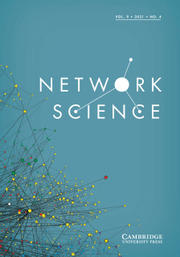Article contents
Mixed-membership of experts stochastic blockmodel
Published online by Cambridge University Press: 16 December 2015
Abstract
Social network analysis is the study of how links between a set of actors are formed. Typically, it is believed that links are formed in a structured manner, which may be due to, for example, political or material incentives, and which often may not be directly observable. The stochastic blockmodel represents this structure using latent groups which exhibit different connective properties, so that conditional on the group membership of two actors, the probability of a link being formed between them is represented by a connectivity matrix. The mixed membership stochastic blockmodel extends this model to allow actors membership to different groups, depending on the interaction in question, providing further flexibility.
Attribute information can also play an important role in explaining network formation. Network models which do not explicitly incorporate covariate information require the analyst to compare fitted network models to additional attributes in a post-hoc manner. We introduce the mixed membership of experts stochastic blockmodel, an extension to the mixed membership stochastic blockmodel which incorporates covariate actor information into the existing model. The method is illustrated with application to the Lazega Lawyers dataset. Model and variable selection methods are also discussed.
Keywords
Information
- Type
- Research Article
- Information
- Copyright
- Copyright © Cambridge University Press 2015
References
- 15
- Cited by

